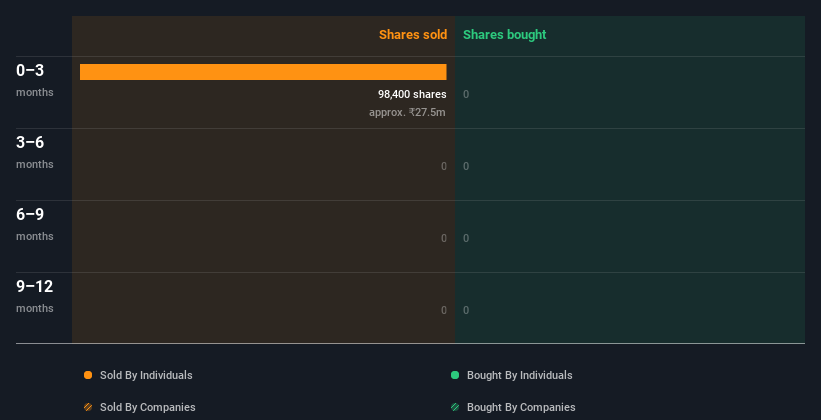Stock Analysis

A number of Arvind Limited (NSE:ARVIND) insiders sold their shares in the last year, which may have raised concerns among investors. Knowing whether insiders are buying is usually more helpful when evaluating insider transactions, as insider selling can have various explanations. However, if numerous insiders are selling, shareholders should investigate more.
While insider transactions are not the most important thing when it comes to long-term investing, we do think it is perfectly logical to keep tabs on what insiders are doing.
See our latest analysis for Arvind
The Last 12 Months Of Insider Transactions At Arvind
Over the last year, we can see that the biggest insider sale was by the insider, Rupa Shah, for ₹26m worth of shares, at about ₹278 per share. That means that an insider was selling shares at slightly below the current price (₹327). As a general rule we consider it to be discouraging when insiders are selling below the current price, because it suggests they were happy with a lower valuation. Please do note, however, that sellers may have a variety of reasons for selling, so we don't know for sure what they think of the stock price. We note that the biggest single sale was 100% of Rupa Shah's holding.
Insiders in Arvind didn't buy any shares in the last year. You can see a visual depiction of insider transactions (by companies and individuals) over the last 12 months, below. By clicking on the graph below, you can see the precise details of each insider transaction!

If you like to buy stocks that insiders are buying, rather than selling, then you might just love this free list of companies. (Hint: insiders have been buying them).
Arvind Insiders Are Selling The Stock
Over the last three months, we've seen significant insider selling at Arvind. In total, insiders dumped ₹27m worth of shares in that time, and we didn't record any purchases whatsoever. In light of this it's hard to argue that all the insiders think that the shares are a bargain.
Insider Ownership
Another way to test the alignment between the leaders of a company and other shareholders is to look at how many shares they own. I reckon it's a good sign if insiders own a significant number of shares in the company. Our data suggests Arvind insiders own 0.4% of the company, worth about ₹380m. But they may have an indirect interest through a corporate structure that we haven't picked up on. We consider this fairly low insider ownership.
So What Do The Arvind Insider Transactions Indicate?
Insiders sold stock recently, but they haven't been buying. And even if we look at the last year, we didn't see any purchases. The company boasts high insider ownership, but we're a little hesitant, given the history of share sales. While we like knowing what's going on with the insider's ownership and transactions, we make sure to also consider what risks are facing a stock before making any investment decision. Case in point: We've spotted 3 warning signs for Arvind you should be aware of.
If you would prefer to check out another company -- one with potentially superior financials -- then do not miss this free list of interesting companies, that have HIGH return on equity and low debt.
For the purposes of this article, insiders are those individuals who report their transactions to the relevant regulatory body. We currently account for open market transactions and private dispositions of direct interests only, but not derivative transactions or indirect interests.
Valuation is complex, but we're helping make it simple.
Find out whether Arvind is potentially over or undervalued by checking out our comprehensive analysis, which includes fair value estimates, risks and warnings, dividends, insider transactions and financial health.
View the Free AnalysisHave feedback on this article? Concerned about the content? Get in touch with us directly. Alternatively, email editorial-team (at) simplywallst.com.
This article by Simply Wall St is general in nature. We provide commentary based on historical data and analyst forecasts only using an unbiased methodology and our articles are not intended to be financial advice. It does not constitute a recommendation to buy or sell any stock, and does not take account of your objectives, or your financial situation. We aim to bring you long-term focused analysis driven by fundamental data. Note that our analysis may not factor in the latest price-sensitive company announcements or qualitative material. Simply Wall St has no position in any stocks mentioned.
About NSEI:ARVIND
Arvind
Arvind Limited, together with its subsidiaries, manufactures, markets, retails, supplies, and exports textiles in India and internationally.
Excellent balance sheet, good value and pays a dividend.

